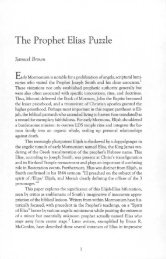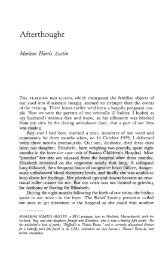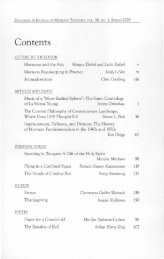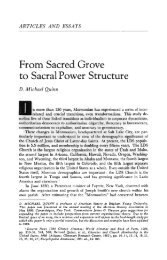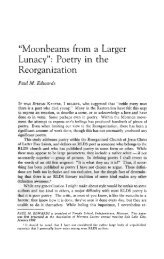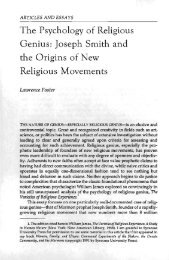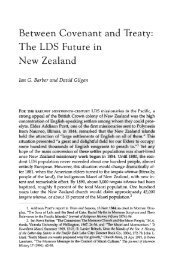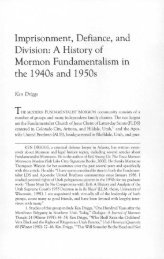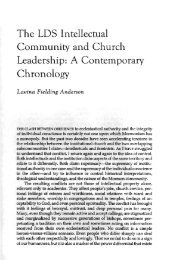Dialogue, Volume 25, Number 2 - Dialogue – A Journal of Mormon ...
Dialogue, Volume 25, Number 2 - Dialogue – A Journal of Mormon ...
Dialogue, Volume 25, Number 2 - Dialogue – A Journal of Mormon ...
You also want an ePaper? Increase the reach of your titles
YUMPU automatically turns print PDFs into web optimized ePapers that Google loves.
Anderson: J e s u s W a n t s M e for ... 9 9<br />
a blanket indictment <strong>of</strong> all wards nor even <strong>of</strong> my own Primary over<br />
the past eleven years. In fact, our Primary is currently in better shape<br />
than it's ever been. We have a stellar president —energetic, clear in her<br />
goals for the children, creative, organized, loving, and gifted at communicating<br />
with children. Five <strong>of</strong> the bishop's seven children are still<br />
in Primary, and his wife replaced me as Sunbeam teacher.<br />
But I want to speak out against the curious blind spot that Primary<br />
occupies institutionally. I have long felt the pain <strong>of</strong> what hierarchy<br />
does to women in the Church, but I have never heard anyone speak<br />
about the damage hierarchy inflicts on children. Ideally, Primary exists<br />
to teach our children gospel principles in a loving setting that will<br />
reinforce the home.<br />
But what are the institutional purposes for the Primary? Obviously,<br />
the institution needs to socialize the children so that they will grow up<br />
to be dependable members <strong>of</strong> the Church —the "future value" function<br />
described by Elder Ballard. This instructional function, equally obviously,<br />
will best be met by age-grouped classes, teachers, and manuals.<br />
These requirements demand meeting spaces, budget, scheduling, and<br />
staffing, all <strong>of</strong> which involve some action on the part <strong>of</strong> the ward's<br />
male leaders. During my years in Primary, our ward has had five<br />
bishoprics. The bishops have all been sincere, committed, kindly men<br />
who have given a very tough job their best effort. I don't believe that<br />
they were unsupportive, and I willingly concede that the Primary<br />
presidency's perspective may be far more positive than mine; but from<br />
my position in the trenches, not one <strong>of</strong> those bishops gave Primary<br />
more than cursory attention aside from periodic visits by the counselor<br />
in charge and turning over one sacrament meeting per year for the<br />
Primary program.<br />
I have few complaints about the meeting spaces and no information<br />
about budget allocations, but the hierarchy's management <strong>of</strong> scheduling<br />
and staffing I find more problematic. Given the block program,<br />
the Primary schedule is set not by the needs <strong>of</strong> the children but by the<br />
needs <strong>of</strong> the other ward members for child care. Primary lasts an hour<br />
and fifty minutes — not for the convenience <strong>of</strong> its teachers and certainly<br />
not because <strong>of</strong> the needs <strong>of</strong> the children but for the convenience <strong>of</strong> the<br />
other ward members. (Primary may be less painful for the children<br />
than many alternatives, but that's a coincidence.) This problem, manifested<br />
in our Primary, stems from the ungainly and inhumane compromise<br />
between the original organizational need to condense the Sunday<br />
meeting schedule that produced the block schedule and the fierce<br />
insistence for institutional representation that kept the Sunday School's<br />
turf more or less intact, but which required a three-hour block instead<br />
<strong>of</strong> a two-hour one. In our ward, three capable men are prevented from








